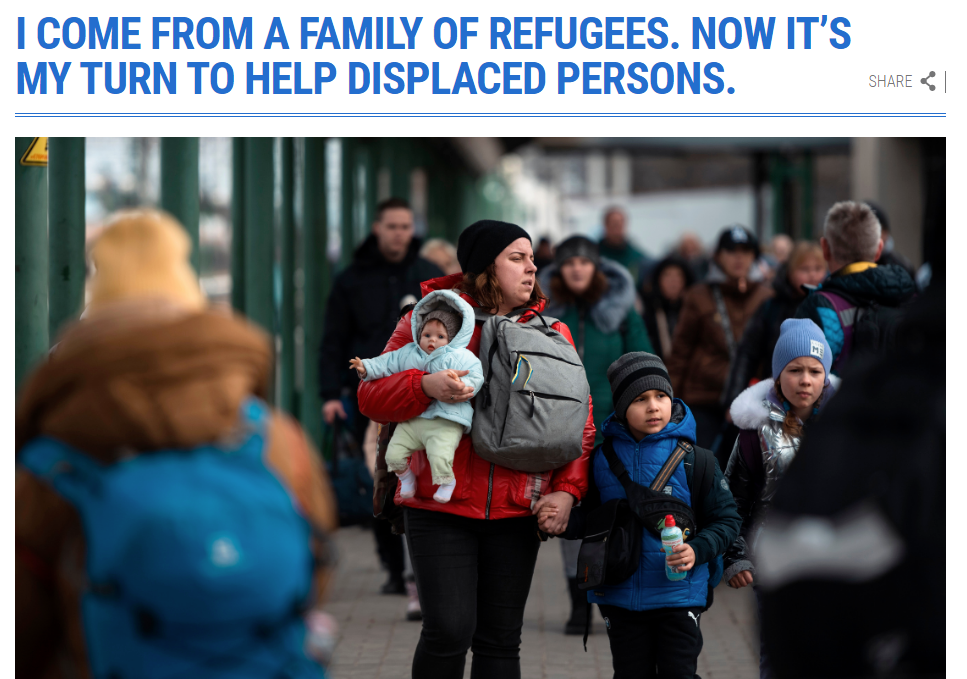|
By the Rev. Steven D. Paulikas, rector of All Saints’ Church, Episcopal Relief & Development board member. Find the article online here.
Episcopal Relief & Development’s support for Ukrainians displaced by war feels personal to me. I’m the rector of All Saints’ Church in Brooklyn and a proud member of Episcopal Relief & Development’s board. But I myself am only one generation removed from war and displacement in Europe. The church’s assistance to my family then made possible my life today—just like how our response today will shape the lives of millions in the decades to come. In 1944, my grandfather disappeared from the Lithuanian village where my family lived. The way the story was told to me, one day he just didn’t come home from work, and that was that. It was during the German occupation of Lithuania, and men from neighboring villages had been disappearing for a few months. Rumors were that they were captured and forced to work for free for the German army–in other words, they were enslaved. My grandmother was left with three small girls, alone at home. The war was not going well for Germany, and the Soviets were closing in from the east. As terrible as the German occupation had been—I was told plenty of stories about that, too—the last time the Soviets were in charge in 1940-41, a different kind of terror had prevailed. My grandmother understood that the Soviet reoccupiers would most likely accuse her of colluding with the Germans because of my grandfather’s absence. There was already news of thousands of people in eastern Lithuania in similar situations being deported to Siberia or executed, so she made the brave decision to take her daughters and flee, leaving behind everything she had ever known, and cast herself out into a completely uncertain future. She was one of roughly 50,000 Lithuanians who fled our homeland during this period. There are so many more stories. They were on the last train out of the country. They saw the tracks being destroyed behind them. They hitchhiked hundreds of miles. One night they slept in a barn during an air raid. For whatever reason—God, good luck, smart thinking—they made it to safety behind Allied lines. My grandfather reunited with his wife and children, and my father was born in November 1945. My family spent five years in what was called a “displaced persons camp” along with almost one million other migrants from Eastern Europe. The camp, near the Bavarian city of Günzberg, was my father’s home for his entire early childhood. My uncle, who was also a child in the same camp, used to tell me how much he looked forward to Easter, because it was one of the few times a year he got to eat meat. But one year, he discovered a long, pinkish tail in the Easter stew—and realized that all this time, they’d been eating rat meat. In 1950, a Roman Catholic priest in Detroit included my family on a list of names of refugees he would personally sponsor for resettlement in the United States. In doing so, the priest and his parish took full financial and legal responsibility for my family, pledging that they would find them a place to live, jobs and help integrate them into American society. My father used to talk about the journey by ship across the Atlantic. He said he remembered being the only person on board who wasn’t seasick the whole time and that all the other passengers gave him their dessert. The six members of my family settled in a two-bedroom apartment above a bar on the west side of Detroit. My grandfather took a job as a janitor at a General Motors factory, where he worked long enough to earn a pension and health insurance for his family. My grandmother cleaned houses. One of her clients was kind enough to put index cards with the English words for furniture and other items around the house. My grandfather never spoke a word of English in his life; my grandmother, because of the strange language instruction she had, spoke a form of English that was basically just a string of nouns. These people were my heroes growing up, and they still are. I am proud to be the child of a refugee. I have never accomplished anything half as impressive as what they did, and I know that the stories I was told are really just a little glimpse into the traumas they actually survived. But the lesson they taught me that lives inside me—the knowledge that is part of my inheritance–is this: it is never finished. Against all odds, they refused to give up. They abandoned their lives multiple times, and each time, the only way they could move forward was by having the faith that there would be a new life on the other side. Death and resurrection, death and resurrection, death and resurrection. So when Jesus says in John 19:30, “it is finished,” he knows it’s not the final word. It’s just this particular life that’s over, but another one awaits. To believe this with him is to be a Christian. More than 70 years after the church offered my family a new life in the United States, All Saints’ Church is proud to be sponsoring a refugee family from Afghanistan for resettlement in New York. Together with other Episcopal parishes, we’ve raised money, recruited volunteers from inside and outside our church communities and found a voice of advocacy for displaced people. We’re discovering new depths of our faith in the process and learning strength and resilience from the family with whom we are working. We also know how many more vulnerable people around the world have been displaced since we started this work, including those who were forced to leave Ukraine. When I hear accounts of violence from Ukrainians, sometimes I simply sit and weep, wondering how this could still be happening so many years after my family experienced the same thing. Then, I’m reminded that through Episcopal Relief & Development, my church is going places where I can’t, helping to ease the burden both of Ukrainians displaced in their own country and those who have fled abroad. I remember stories of acts of Christian kindness offered to my family and my own burden is lessened just a little because of the knowledge that Episcopal Relief & Development is part of Christ’s presence in the midst of suffering. Whenever you meet a refugee, remember this: they have died and risen again. The only reason they are still here is because they had faith that when the life they loved or hated or were indifferent to nonetheless came to an end, that it wasn’t finished for them. May their faith be our own.
0 Comments
Leave a Reply. |
Archives
June 2023
Categories
All
|


 RSS Feed
RSS Feed